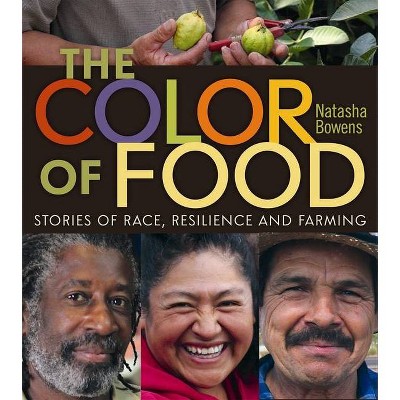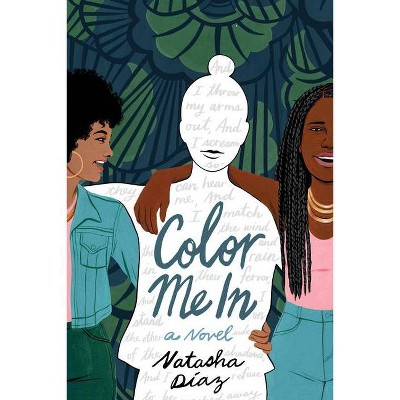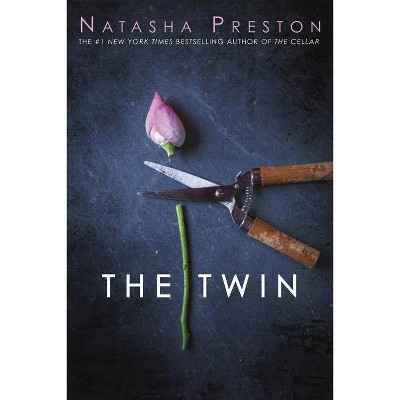The Color of Food - by Natasha Bowens (Paperback)

Similar Products
Products of same category from the store
AllProduct info
<p/><br></br><p><b> About the Book </b></p></br></br><p> The Color of Food sheds light on the issues that lie at the intersection of race and farming. It challenges the status quo of agrarian identity for people of color, honoring a history richer than slavery and migrant labor. By sharing and celebrating their stories, this collection reveals the remarkable face of the American farmer. </p><p/><br></br><p><b> Book Synopsis </b></p></br></br><p><strong>Redefining the face of the American farmer</strong></p><p>The growing trend of organic farming and homesteading is changing the way the farmer is portrayed in mainstream media, and yet, farmers of color are still largely left out of the picture. <em>The Color of Food </em>seeks to rectify this. </p><p>By recognizing the critical issues that lie at the intersection of race and food, this stunning collection of portraits and stories challenges the status quo of agrarian identity. Author, photographer, and biracial farmer Natasha Bowens' quest to explore her own roots in the soil leads her to unearth a larger story, weaving together the seemingly forgotten history of agriculture for people of color, the issues they face today, and the culture and resilience they bring to food and farming. </p><p><em>The Color of Food </em>teaches us that the food and farm movement is about more than buying local and protecting our soil. It is about preserving culture and community, digging deeply into the places we've overlooked, and honoring those who have come before us. Blending storytelling, photography, oral history, and unique insight, these pages remind us that true food sovereignty means a place at the table for everyone. </p><p>If one imagines the typical American farmer, many people visualize sun-roughened skin, faded overalls, and calloused hands--hands that are usually white. While there's no doubt the growing trend of organic farming and homesteading is changing how the farmer is portrayed in mainstream media, farmers of color are still largely left out of the picture. </p><p/><br></br><p><b> From the Back Cover </b></p></br></br><b></b> REDEFINING THE FACE OF THE AMERICAN FARMER <p> Anyone who eats should read this book: You will come to the table with new appreciation for the intersections between race and food that so often go unsaid and undocumented. Kudos to Bowens for creating this powerful and important book. <br/> Anna Lappé, author, <em> Diet for a Hot Planet </em> and <em> Hope's Edge </em></p><p><strong> A STUNNING COLLECTION </strong> of portraits and stories, The Color of Food sheds light on the seemingly forgotten agricultural story of people of color. Author, photographer and biracial farmer Natasha Bowens' quest to explore her own roots in the soil leads her to unearth a larger story, weaving together culture, resilience and the critical issues that lie at the intersection of race and farming. </p><p><em> The Color of Food </em> teaches us that the food and farm movement is about more than buying local and protecting our soil. It is about preserving community, digging deeply into the places we've overlooked, and celebrating those who have come before us. Blending storytelling, photography, oral history, and unique insight, these pages remind us that true food sovereignty means a place at the table for everyone. </p><p> ... step into the cultural history of our foods and the beautiful and proud people that grow them. <br/> Cynthia Hayes, executive director, Southeastern African American Farmers Organic Network </p><p><strong> Natasha Bowens </strong> is an author, beginning farmer, and community activist who focuses on building empowerment and community through food and storytelling. She is the creator of the multimedia project <em> The Color of Food </em> . </p><p/><br></br><p><b> Review Quotes </b></p></br></br><br><p>Shelia Trask, Publishers' Weekly, Summer 2015 <p/>Bowens's deep political understanding is obvious throughout her book; she's knowledgeable about the history of oppression that affects farmers of color today and can explain the effects of political pacts like NAFTA on Mexican farmers, all while delivering pertinent statistics that illustrate her points. At heart, though, this is a book about the people themselves.</p> <p/><p>What a book! Dive into the stories and photographs Natasha Bowens shares in these pages and you come up for air with a profound appreciation for the diversity of people planting the seeds and harvesting the foods to keep alive cultural traditions and nourish communities around the country. Anyone who eats should read this book: You will come to the table with new appreciation for the intersections between race and food that so often go unsaid and undocumented. Kudos to Bowens for creating this powerful and important book. &mdahs; Anna Lappe, author, <em>Diet for a Hot Planet and Hope's Edge </em></p> <p/><p>Natasha Bowens, through her compelling stories and powerful images of a rainbow of farmers, reminds us that the industrialization of our food system and the oppression of our people -- two sides of the same coin -- will, if not confronted, sow the seeds of our own destruction.<br> &mdahs; Mark Winne, author, <em>Closing the Food Gap: Resetting the Table in the Land of Plenty</em></p> <p/><p><em>The Color of Food </em>captures the heart and souls of farmers of color... farmers that are frequently forgotten as the stories of agriculture in our country are told. Through the lens of a camera we step into the cultural history of our foods and the beautiful and proud people that grow them.<br> &mdahs; Cynthia Hayes, executive director, Southeastern African American Farmers Organic Network</p> <p/><p>True to her ancestral ties, Natasha brings forth the hope of a new generation of young people of color fixed on recapturing the energy, history and tradition of farming. The power of storytelling is etched in each farmer's tale of courage and resiliency as they look at farming, not as oppressive, but as a vibrant celebration of who they are. <em>The Color of Food</em> makes the ancestors rise up in triumph!<br> &mdahs; Karen Washington, farmer, activist, and cofounder, Black Urban Growers </p> <p/><p>It is impossible to understand food in America without digging deeply into "race," class and culture. People's perceptions are their realities, and <em>The Color of Food</em> contributes to changing our reality by changing our perception of the hands, hearts and faces in the food movement.<br>---Malik Yakini, executive director, Detroit Black Community Food Security Network</p> <p/><p>Natasha Bowens brings us two critical reminders: the potential and pitfalls of "a movement" in any singular form; and the importance of vision and determination in doing truly groundbreaking research.<em> The Color of Food </em>represents the best kind of research--inspired and independent, a project of deep listening and unbounded sharing. Our task is to cultivate the questions she scatters, in a rich and colorful light.<br> &mdahs; Philip Ackerman-Leist, author, <em>Rebuilding the Foodshed </em>and director of the Masters in Sustainable Food Systems, Green Mountain College</p> <p/><p>The food movement has woken the world to joy of food, but the beauty of the people who grow it is too often hidden. That's why Brown Girl Farming is so gorgeous. This is a book that celebrates the food movement leaders to whom I've been honored to be able to turn for wisdom. To read Natasha Bowen's journey through North America is to draw from the rich, exquisite and too often hidden work of people of color in reinventing the modern food system. From First Nation to immigration, there isn't a topic on which Bowen's curiosity doesn't latch, nor her camera capture. It's a must-share book for anyone who holds hope in their hearts about the future of food. &mdahs;Raj Patel, Author of <em>Stuffed and Starved </em><br><br><P>Shelia Trask, Publishers' Weekly, Summer 2015 <BR>Bowens s deep political understanding is obvious throughout her book; she s knowledgeable about the history of oppression that affects farmers of color today and can explain the effects of political pacts like NAFTA on Mexican farmers, all while delivering pertinent statistics that illustrate her points. At heart, though, this is a book about the people themselves. <P>What a book! Dive into the stories and photographs Natasha Bowens shares in these pages and you come up for air with a profound appreciation for the diversity of people planting the seeds and harvesting the foods to keep alive cultural traditions and nourish communities around the country. Anyone who eats should read this book: You will come to the table with new appreciation for the intersections between race and food that so often go unsaid and undocumented. Kudos to Bowens for creating this powerful and important book. &mdahs; Anna Lappe, author, Diet for a Hot Planet and Hope's Edge <BR><P>Natasha Bowens, through her compelling stories and powerful images of a rainbow of farmers, reminds us that the industrialization of our food system and the oppression of our people -- two sides of the same coin -- will, if not confronted, sow the seeds of our own destruction.<BR> &mdahs; Mark Winne, author, Closing the Food Gap: Resetting the Table in the Land of Plenty <BR><P>The Color of Food captures the heart and souls of farmers of color... farmers that are frequently forgotten as the stories of agriculture in our country are told. Through the lens of a camera we step into the cultural history of our foods and the beautiful and proud people that grow them.<BR> &mdahs; Cynthia Hayes, executive director, Southeastern African American Farmers Organic Network <BR><P>True to her ancestral ties, Natasha brings forth the hope of a new generation of young people of color fixed on recapturing the energy, history and tradition of farming. The power of storytelling is etched in each farmer s tale of courage and resiliency as they look at farming, not as oppressive, but as a vibrant celebration of who they are. The Color of Food makes the ancestors rise up in triumph!<BR> &mdahs; Karen Washington, farmer, activist, and cofounder, Black Urban Growers <P>It is impossible to understand food in America without digging deeply into race, class and culture. People s perceptions are their realities, and The Color of Food contributes to changing our reality by changing our perception of the hands, hearts and faces in the food movement.<BR>---Malik Yakini, executive director, Detroit Black Community Food Security Network <P>Natasha Bowens brings us two critical reminders: the potential and pitfalls of a movement in any singular form; and the importance of vision and determination in doing truly groundbreaking research. The Color of Food represents the best kind of research inspired and independent, a project of deep listening and unbounded sharing. Our task is to cultivate the questions she scatters, in a rich and colorful light.<BR> &mdahs; Philip Ackerman-Leist, author, Rebuilding the Foodshed and director of the Masters in Sustainable Food Systems, Green Mountain College <BR><P>The food movement has woken the world to joy of food, but the beauty of the people who grow it is too often hidden. That s why Brown Girl Farming is so gorgeous. This is a book that celebrates the food movement leaders to whom I ve been honored to be able to turn for wisdom. To read Natasha Bowen s journey through North America is to draw from the rich, exquisite and too often hidden work of people of color in reinventing the modern food system. From First Nation to immigration, there isn t a topic on which Bowen s curiosity doesn t latch, nor her camera capture. It s a must-share book for anyone who holds hope in their hearts about the future of food. &mdahs;Raj Patel, Author of Stuffed and Starved "<br><br><BR><P>What a book! Dive into the stories and photographs Natasha Bowens shares in these pages and you come up for air with a profound appreciation for the diversity of people planting the seeds and harvesting the foods to keep alive cultural traditions and nourish communities around the country. Anyone who eats should read this book: You will come to the table with new appreciation for the intersections between race and food that so often go unsaid and undocumented. Kudos to Bowens for creating this powerful and important book. &mdahs; Anna Lappe, author, Diet for a Hot Planet and Hope's Edge <BR><P>Natasha Bowens, through her compelling stories and powerful images of a rainbow of farmers, reminds us that the industrialization of our food system and the oppression of our people -- two sides of the same coin -- will, if not confronted, sow the seeds of our own destruction.<BR> &mdahs; Mark Winne, author, Closing the Food Gap: Resetting the Table in the Land of Plenty <BR><P>The Color of Food captures the heart and souls of farmers of color... farmers that are frequently forgotten as the stories of agriculture in our country are told. Through the lens of a camera we step into the cultural history of our foods and the beautiful and proud people that grow them.<BR> &mdahs; Cynthia Hayes, executive director, Southeastern African American Farmers Organic Network <BR><P>True to her ancestral ties, Natasha brings forth the hope of a new generation of young people of color fixed on recapturing the energy, history and tradition of farming. The power of storytelling is etched in each farmer s tale of courage and resiliency as they look at farming, not as oppressive, but as a vibrant celebration of who they are. The Color of Food makes the ancestors rise up in triumph!<BR> &mdahs; Karen Washington, farmer, activist, and cofounder, Black Urban Growers <P>It is impossible to understand food in America without digging deeply into race, class and culture. People s perceptions are their realities, and The Color of Food contributes to changing our reality by changing our perception of the hands, hearts and faces in the food movement.<BR>---Malik Yakini, executive director, Detroit Black Community Food Security Network <P>Natasha Bowens brings us two critical reminders: the potential and pitfalls of a movement in any singular form; and the importance of vision and determination in doing truly groundbreaking research. The Color of Food represents the best kind of research inspired and independent, a project of deep listening and unbounded sharing. Our task is to cultivate the questions she scatters, in a rich and colorful light.<BR> &mdahs; Philip Ackerman-Leist, author, Rebuilding the Foodshed and director of the Masters in Sustainable Food Systems, Green Mountain College <BR><P>The food movement has woken the world to joy of food, but the beauty of the people who grow it is too often hidden. That s why Brown Girl Farming is so gorgeous. This is a book that celebrates the food movement leaders to whom I ve been honored to be able to turn for wisdom. To read Natasha Bowen s journey through North America is to draw from the rich, exquisite and too often hidden work of people of color in reinventing the modern food system. From First Nation to immigration, there isn t a topic on which Bowen s curiosity doesn t latch, nor her camera capture. It s a must-share book for anyone who holds hope in their hearts about the future of food. &mdahs;Raj Patel, Author of Stuffed and Starved <BR>"<br><p/><br></br><p><b> About the Author </b></p></br></br><p><b> Natasha Bowens </b> is an author, farmer, and political activist whose advocacy focuses on food sovereignty and social issues. As a young biracial woman in today's agricultural movement, she is dedicated to honoring, preserving and amplifying the stories of Black, Native, Asian and Latina farmers and food activists. Her multimedia project <i> The Color of Food </i> evolved from her work exploring the intersection of race and agriculture for <i> Grist </i> magazine, and from her blog <i> Brown.Girl.Farming </i>, where she writes about issues related to racial inequality, food sovereignty, and resilience. Natasha has interviewed and photographed over 65 North American farmers of color; her work has garnered her national media attention, and she has been featured on CNN, <i> The Atlantic </i>, and <i> Colorlines </i> . </p>
Price History
Price Archive shows prices from various stores, lets you see history and find the cheapest. There is no actual sale on the website. For all support, inquiry and suggestion messagescommunication@pricearchive.us




















